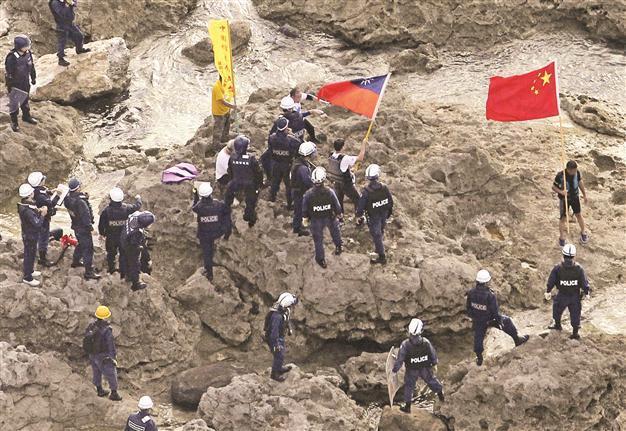Island row strains Japan-China ties
TOKYO

Activists carry Chinese and Taiwanese flags as they landed on Uotsuri Island, one of the islands of Senkaku in Japanese and Diaoyu in Chinese, in East China Sea. AP photo
Japan has decided to deport Chinese activists who landed on a disputed isle at the heart of a territorial row, Kyodo news agency reported yesterday, a move that could ease tension between Asia’s two biggest economies.Seven of the 14 activists arrested had waded ashore and planted a Chinese flag on the rocky, uninhabited isle on Aug. 15, prompting Japan and China to trade protests over the incident. The group of activists had sailed from Hong Kong on Aug. 12 to the archipelago.
The feud over the islands in the East China Sea has frayed relations between the two Asian neighbors, long bedeviled by the legacy of Japan’s wartime occupation of much of China and contemporary rivalry over resources and regional clout. The landing, coinciding with the 67th anniversary of the end of World War II, parallels tensions between China and Southeast Asia over rival territorial claims in the South China Sea. China’s lengthening naval reach has fed worries that an aggressive Beijing could brandish its military might to get its way and galvanized Chinese citizens’ demands for tough action.
Both want to cool things down, says expert
An expert said that both Beijing and Tokyo probably want to cool things down, given their close economic ties. “But when issues touching on nationalism are involved, there are aspects politicians cannot control. Things will not be resolved automatically and careful responses are needed,” said Akio Takahara, a University of Tokyo professor, before news that the activists would be deported, Reuters reported. The United States also called on all sides to avoid “provocations” after the arrest of activists. “We expect the claimants to resolve the issue through peaceful means,” State Department spokeswoman Victoria Nuland said.
Under Japanese law, a foreigner who does not have permission to be in Japan can be turned over to immigration authorities for immediate deportation when the individual is not facing other criminal charges.
















